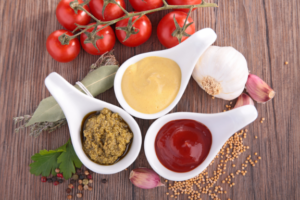In the cupboard or in the fridge? People oftentimes get confused when asked where they store their condiments. We will give you reasons why some of your condiments need to stay in the fridge. This may also save you and not risk your health.
In the fridge
Ketchup
The controversy has caused feud whether to keep it in the fridge or to not stay in the fridge. Experts say that you can do either. Others want their ketchup chilled that why they put it in the fridge. But it’s okay to place it in the pantry as it has low acidity from the vinegar and tomatoes and, which doesn’t stimulate the growth of bacteria.
Mustard
Same category with the ketchup. The acidity level inside the mustard is low enough that bacteria don’t have a chance to spread inside of it. If you want to preserve the color they let it stay in the fridge. Either way is okay.
Salad Dressing
This should be in the fridge most especially after opening along with oily dressings like Italian and vinaigrettes should be kept chilled after opening as well. Because their key ingredients—things such as citrus juice and shallots —will spoil without refrigeration.
Mayonnaise
I don’t refrigerate mayonnaise, based on my experience but I guess I have to now. It is not safe due to the egg. Also, the USDA suggests that opened mayonnaise reaching 50 degrees or higher should be thrown away.
Jam
This contains a minimal amount of water but high in sugar. You might think that it’s okay outside the fridge but it’s not.
Nevertheless, some experts still recommend keeping the jam preserves to stay in the fridge. Bacteria might grow when contamination occurs which will turn your jam rancid.

Butter
Everyone knows that this should be placed inside the fridge. Obviously, it will melt in hot places. Butter is abstrusely a dairy product, the FDA makes an exception for butter. Because it has considerably a little lactose than its milk and cream relatives. Because of this, butter is not a Temperature Control for Safety (TCS) food, meaning, it can be eaten and stored safely at room temperature.
Hot sauce
For those who like more spice in their life, if you want to lengthen the shelf life, keep it in the fridge. Keeping it in the pantry or cupboard is also okay for this hot stuff. Thanks to salt and vinegar, it preserves the hot sauce.
Quick tips
- Always check for the expiration date, especially when a product is on sale, DOUBLE CHECK it!
- Check the ingredients that may cause your condiments to go rancid.
- Remember that any food that contains dairy or eggs must stay in the fridge.
- Fermented sauces like soy sauce are high in salt, have less water content, and don’t need refrigeration.
- Keep this in mind that if you’re still having doubt about where to store your food – cupboard or fridge – just put it in the fridge. Nothing will ever go bad inside the fridge unless you pull the plug.
- Using an air-tight lock jar will add aid to your condiments. It keeps the air out and lengthens the shelf life of your condiments.
- Use your common sense, as well.
- Nut oils (like sesame or almond oil) should also stay in the fridge to prevent from going rancid.
Even if some condiments are commercially produced, as a general rule of thumb, condiments that contain dairy, fruits, and vegetables need to stay in the fridge. There are plenty of condiments for which the fridge is optional. The key contemplation is how long it will take your family to finish off the bottle.












